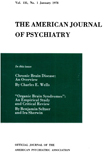Postpsychotic state, convalescent environment, and therapeutic relationship in schizophrenic outcome
Abstract
The authors evaluated the following variables in the 2-3-year outcomes of 30 schizophrenic patients: the acute/chronic dichotomy, the presence of a postpsychotic regressive state, the quality of the convalescent environment, and the formation of a therapeutic relationship. They found that the presence of a postpsychotic regressive state was not associated with either good or poor short-term outcome; that the diagnosis of acute schizophrenia was almost invariably followed by good outcome, but a diagnosis of chronic schizophrenia had little predictive value; and that a favorable convalescent environment and the presence of a therapeutic relationship were signigicantly associated with good outcome.
Access content
To read the fulltext, please use one of the options below to sign in or purchase access.- Personal login
- Institutional Login
- Sign in via OpenAthens
- Register for access
-
Please login/register if you wish to pair your device and check access availability.
Not a subscriber?
PsychiatryOnline subscription options offer access to the DSM-5 library, books, journals, CME, and patient resources. This all-in-one virtual library provides psychiatrists and mental health professionals with key resources for diagnosis, treatment, research, and professional development.
Need more help? PsychiatryOnline Customer Service may be reached by emailing [email protected] or by calling 800-368-5777 (in the U.S.) or 703-907-7322 (outside the U.S.).



